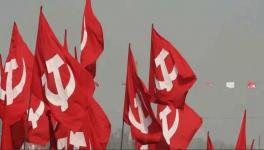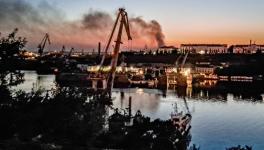Areva's Bankruptcy and Indo-France Nuclear Agreement
One of the highlights of Prime Minister Modi’s vist to France in April this year, was the signing of an agreement for construction of a nuclear power plant in Jaitapur with the French company Areva. At the time the Prime Minister declared that “this is the biggest achievement, even more than Make in India as France has agreed to give us technology for nuclear reactors” Areva, which was already in financial difficulty at the time, has now been declared technically bankrupt – and is being split up by the French government, which is its majority shareholder.
Newsclick discusses the matter with Prabir Purkayastha, editor of Newsclick and part of the Delhi Science Forum. Why did India signed this agreement with Areva, despite the fact that the company has not delivered a reactor in almost a decade and the whole world is moving away from nuclear power? Will the deal still be upheld by the French leading to technology transfer to India?
Rishab Bailey (RB): Hello and welcome to Newsclick. One of the highlights of the Prime Minister Modi's visit to France in April earlier this year was signing of the agreement with French company for the construction of a Nuclear Plant in Jaitapur. This self proclaimed global leader in nuclear energy Areva is now likely to go bankrupt. At the time the Prime Minister declared that this is the biggest achievement even more than make in India as France has agreed to give us technology for nuclear reactors. So joined today by Prabir Purkayastha, editor of Newsclick and member of Delhi Science Forum to discuss why this signing agreement with Ariva and it's consequences. Hi Prabir. Now, Areva despite being one of the biggest nuclear companies in the world has been in a perlious financial situation in the world? Why is this and what does it tell about the state of and future of the nuclear industry.
Prabir Purkayastha (PP): Well, one of the reason why Ariva is in trouble is of course is that nuclear industry itself is not doing well in the world. So you can come to that little later. Specifically, these were the current reactors that Areva was sending to India and other places what is called the generation three reactor which is 1600 MW in size. The two reactors which are under construction the first two in fact, one is in Finland and and one is in France itself. The Finnish one, which is the first one was supposed to be commissioned by 2010. It is about five years after the placement of the order, it's now supposed to go on street by 2018. It's about 9 years behind the time. So there has been a huge cost over and time over certainly cost over almost to the tune of 3 times and therefore, the financial loses for Areva because those were in some sense fixed price contracts. Who will take the loss, who is to be blamed. The legal issue that were going so therefore, the reacted market obviously is not doing well considering the costs that have gone up, the cost that's likely to be incurred for new reactors so this does not seem to be financially or economically, nuclear power using EPR 1600 does not seem to be a viable alternative. So that's the larger issue and Areva I think has lost 8 billion dollars in the last four years and it's survival is till now has basically on the supply nuclear fuel to the plants that they have built earlier and so on, maintenance of those plants. So new reactor business is certainly not going to help in fact, every new reactor gets in order it runs into further losses. That's the Areva problem. As far as India is concerned, we have been signing Indo-US nuclear deal by the UPA government earlier Manmohan Singh government. There was this whole argument which was sod that there was this nuclear renaissance, a lot of nuclear power plants are going to come up, nuclear is viable and generation three the risks are not there and this is really the tune that was sung for which we are getting French reactors, we are getting Westinghouse reactors in other places. So this were all a part of larger bricks that Modi has continued and Modi also has seems taken this opportunity also to reach an agreement with France, so the huge order again with Areva. It seems to be a part of the PR exercise of the government of trying to build relationship with France and therefore claim that they are going to give this technology to us and to me, it doesn't seem likely for two reasons. One is Jaitapur itself financially will never be able to come on street and whether the cost of Jaitapur justifies the nuclear plant there with Areva. That is one. Secondly, now that we know Areva will be taken over by EDF. EDF is not clear that it is going to maintain this particular design of Areva considering EPR 1600 MW unit does not seem to have...
RB: We will come to that issue but first but I am going back again. So why India sign this agreement with Areva in the first place. I mean you have already pointed out the various cost over runs and safety concerns which were also raised with regard to in Areva plants in Finland and so on. The steel core of the reactor it seems was not manufactured properly, so given we knew that they were not meeting technical specifications. We knew that they were in financial difficulty. If the technology transfer which have been promised to us by the French really is that valuable. Is that why we are signing this agreement and Is that worth going for them?
PP: The EPR itself is a big question mark. There are technical reasons why there are problems. There are problems have arisen with the existing instruction and as you point out basic flaws have been found in the design. They have been trying to rectify them so EPR is an unsuccessful design if you will. A plant which is supposed to be completed in five years if it take fourteen years then it has to be said a technological problem over there. Of course, larger problem with the nuclear has been the cost and the time over and so this is nothing which is qualitatively new. But this is really even in that seems to be a very big problem. So to me, it's not a technical reason. Why we went in for the Jaitapur with Areva. It was more political reason to get France back us with Indo-US nucelar deal, the nuclear suppliers group that was one of the reasons and this time this seems to have been much more based on Modi wanted to declare a success.
RB: What do you think actually now happen on the ground so far as Jaitapur plant is concerned? Do you think its now make sense to actually pull plug on the project now given what we know of Areva's technology and the likely cost over runs? We had instances past in India, numerous instances power plants had actually ended up producing power at a far greater cost at initially expected which has then led to problems down the line, I mean Dabhol was very very good example of this. So what do we do now policy perspective here in India?
PP: There is a question if you take Jaitapur route with the reactors, we are going down the Dabhol route the Enron route because the non-viable economic technology. The cost of nuclear power from such a plant and we have done the calculations is going to be probably two and a half times to three times the cost from the equivalent plant which would really put in on par with solar energy today, which means if you take the risk of a nuclear plant, uncertain technology, the time requireed to put up a nuclear plant then you are much better off with a solar plant. If you are really willing to spend three times cost for electricity, then solar is obviously a viable route. So I think overall terms, Jaitapur makes no sense today. It does not make technical sense, it does not make economic sense.
RB: Now, the latest edition of the nuclear energy status report points to actually many of the facts that you just mentioned it talks about how for instance Japan which has been reliant on nuclear energy not used nuclear power for the first time in a full calender for more than 50 years. It talks about how nuclear power plants across the world are been decommissioned or one which have been built are been stalled so on and so forth. The share the nuclear energy in global energy market is reducing. So why then India is continuing to pursue this nuclear option despite the fact that we now that it is not really worthwhile then as you point out solar is probably a far better option. Do we have no choice in India given that we do have that massive energy requirements we can not meet through traditional fossil fuels?
PP: Let's get into the second issue later. The question is technologically is nuclear is a barren option in other words. I would say important reactors don't make sense. Important reactors don't make sense because the cost we are seeing is either through Westinghouse reactor or the Areva reactors are much higher.
RB: But we don't know how to build our own.
PP: That's not true we have built twenty two nuclear plants which nuclear unit which is running in India and bulk of them have been built with our indigenous technology. Only the first six, you could say two were Westinghouse reactors then we had Candu reactors and now we have Russian reactors, Kudankulam the Russian reactors. So bulk of the reactors are indigenously built based on what we imported initially from Canada, it's a Candu reactors and we then indigenous them and built them ourselves. We expanded their size, we went to more than 500 MW from 235 MW and so on. So we have the ability to build nuclear plants, there have been questions regarding Nuclear plant, safety, hazards and so on. But I think, by and large the Candu reactors designed was relatively safe designed and we have successfully indiginised the technology and the cost of that is relatively lower. Does it still make economic sense, that's something to be discussed. But it is certainly lower than for instance the nuclear reactors we are talking about importing which are really much higher and they are also relatively untested designs. Both the Westinghouse reactor and the Areva reactors are relatively untested designs because not a single generation three nuclear reactor has yet come on stream. So we are really going to be guinea pigs in some sense in that sense. But the question of nuclear energy itself is it because we need a lot of energy therefore we have to have all sources of energy I think it's a spurious argument because very simply, the question of interchangeability of technology is always there. So if you want to build a nuclear plant and that cost if you build three other plants the question of needing all sources doesn't arise. It's the choice that you make in the basket of energy you have how much in hydro, how much in wind, how much in coal, how much in gas and how much will be say solar. So these are choices you make. In that's it's very clear that over a period of time the cost of renewable are dropping and the cost of nuclear are not only not dropping but actually going up because as we discover more and more risks associated with nuclear power the cost of protecting against those risks been higher capital costs. So that's the nuclear problem. Nuclear is probably the only technology that I know of where the cost has consistently gone or risen with time. Most technologies are cost reduces with time, nuclear is not one of them.
RB: As a slightly connected issue not directly relevant to this subject. We have heard a lot of about how the American suppliers of nuclear equipment are unwilling to come to India because of the civil nuclear liability arrangement which we have here. How come we don't see similar opposition to this nuclear regime here in India from companies in France or Russia. They seem more than eager to do business with India.
PP: Areva clearly they were desperate and most of the nuclear industry is desperate. The American Industry has had a completely risk free of the regime because of the US laws that existed. So they are willing to take risks whatsoever and they are really not risks. What it says, the liability law in India very clearly state that if there is an accident, then whoever the reactor operator is will have to pay money in any case he can sue if there is a flaw in the design. It's not directly to sue the reactor company but the operator company can sue the company if they can be shown that they have made a mistake and secondly, it is cap to whatever the operating company has paid which again 300 million HDR is the limit anyway. So it is not that there is no cap therefore, the 300 million HDR limit on potential damage is the fraction of the cost of the reactor sale. That's all the time we have today. Do join us on Newsclick on another episode.
DISCLAIMER: Please note that transcripts for Newsclick are typed from a recording of the program. Newsclick cannot guarantee their complete accuracy.
Get the latest reports & analysis with people's perspective on Protests, movements & deep analytical videos, discussions of the current affairs in your Telegram app. Subscribe to NewsClick's Telegram channel & get Real-Time updates on stories, as they get published on our website.
























